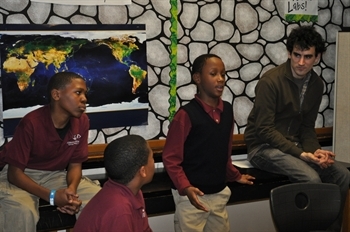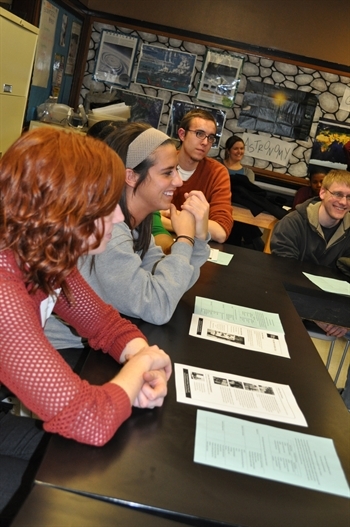ISU students take on Mikva Challenge
Ben Levine
Published: March 15, 2012

Ernest Sanders
For any new teacher the first few years can be tough. Not only are teachers responsible for getting students to master the curriculum, but they must also manage their class so that students can learn. While many recent studies have discussed the economic impact of good and effective teachers, rarely do these studies give specific answers to the question for any new teacher to ask themselves, “What makes a good teacher good?” For the participants of the Chicago Teacher Education Pipeline this is a question whose need for answering is becoming immediate.
The Chicago Teacher Education Pipeline led by the Illinois State University College of Education has worked with the neighborhood of Little Village over the past five years placing freshly minted teachers in schools in Little Village as teachers, but also has helped them find residence in this community so that they can better serve their students. Most recently this project has been expanded to the Auburn-Gresham community located on Chicago’s South Side. Working in conjunction with the Greater Auburn-Gresham Development Corporation (GADC), the Teacher Pipeline is hoping to reverse the idea that teachers are not part of the community that they work in.
In order to help these new teachers, the students of the Peace and Leadership Council at Perspectives Middle Academy spent their Monday afternoon demonstrating how teachers should handle certain situations that occur in their school. The students of the council created and performed skits demonstrating multiple ways students would like to see the situation be handled and not be disrespected.
After each skit the students decribed what happened and stated their recommendations for how teachers should respond. A few examples of recommendations included teachers remining calm when interruptions occur in class and them being prepared to explain things multiple times so that students can understand the lesson. By following these recommendations, the students think that students will better be able to learn and that teachers will be more prepared for when they start teaching in the neighborhood.

Ernest Sanders
After the skit presentation the potential teachers and students asked questions of one another including what type of schools the teachers wanted to be in, how teachers can better relate to students and also what qualities students like in their teachers. According to the students, teachers could help them best by building trust with themselves and trying to get to know them beyond their academic life. By giving these new teachers a sneak preview about what their students want, the teachers will be better prepared when they begin to work in any school system, especially in the schools of Auburn-Gresham.